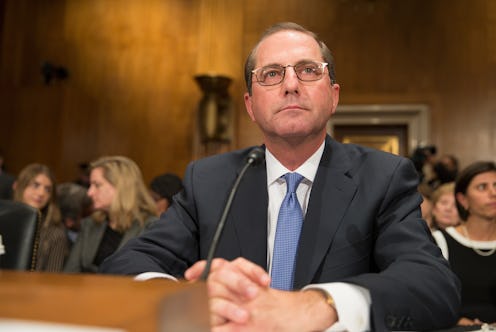News
Trump’s Health Secretary Pick Would Let Your Boss Block Your Birth Control Coverage

President Trump's new nominee for health and human services secretary had his Senate confirmation hearing on Wednesday, where lawmakers grilled him about his position on birth control coverage. Trump's pick, Alex Azar, said the agency should be weighing employers' consciences against women's birth control access. This suggests that he is aligned with the Trump administration's position that companies may stop covering birth control for their employees.
Sen. Patty Murray (D-Wash.) questioned Azar about this crucial women's health issue. The Trump administration took steps in October to make it easier for employers to limit coverage of birth control in their employees' health insurance plans. Murray asked if Azar would commit to putting "science and health care access first," rather than "ideology and extremism."
"We have to balance a woman's choice of insurance with the conscience of their employers," Azar responded. That answer was of great concern to the senator. Murray tells Bustle in a statement that corporations should not be put above women's health care:
Women deserve to make their own decisions about their reproductive health, without their employer or the government interfering. I have deep concerns about Alex Azar's ability to prioritize women's access to health care over corporations, and I will continue to hold this Administration's feet to fire as they promote their extreme, anti-women agenda.
It was also troubling to abortion rights advocates: NARAL Pro-Choice America President Ilyse Hogue said in a statement that the "Senate should use this opportunity to stand up to Donald Trump's dangerous, backwards agenda and refuse to confirm Azar."
Reproductive rights advocates also have noted Azar's speech to the Islamic Medical Association of North America in 2006, when he thanked them for their "emphasis on protecting the health and well-being of the unborn." They have taken his contributions to anti-choice politicians as a sign that he would limit birth control access. Before working as the president of major drug company Eli Lilly's U.S. division, Azar was deputy secretary of health and human services from 2005 to 2007 under George W. Bush.
NARAL's Hogue wrote in the statement:
Alex Azar is a man who used his position of power to undermine abortion access and the basic rights women need to be equal partners in society. His explicitly anti-choice record makes clear that he'll use a position at HHS to further attack reproductive freedom. Donald Trump's disdain for women knows no bounds, so his nomination of Azar to lead the department with so much power over our reproductive rights comes as no surprise.
Azar's full response to Murray acknowledged that he and the senator have different opinions on how to best carry out HHS programs.
"I'm the secretary for all Americans," Azar said. "I would faithfully implement [HHS] programs. We may differ in different elements of how those get implemented, but I firmly believe in following evidence and science."
Murray didn't let him avoid the issue of birth control access, though, and doubled down on her question. "Do you believe all women should have access to the health care their doctor recommends for them? Yes or no?" she pressed him. That's when he made his point about balancing employers' and women's concerns:
If the issue is, for instance, the ... conscience exception that HHS has come out with, I do believe we have to balance, of course, a woman's choice of insurance that she would want with the conscience of employers and others. That's a balance. That's sort of American values.
Murray then tripled down. "The woman's doctor recommends it, but you believe the employer has the precedence over that?" she said.
"Not in terms of access, but in terms of insurance," Azar responded. "To force those very few... I believe it's less than 200 have come forward, very few employers would be impacted by that conscience exception. To respect, frankly, their rights as well as women's access through the insurance."
Murray disagreed, saying, "I think women's access to health care their doctor requires for them should take precedence."